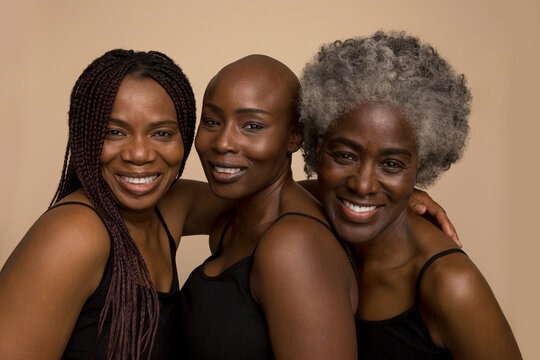Transform your health. transform your life.
Midlife & Menopause: What Black Women Need to Know and How to Navigate the Transition with Confidence
Although all women will go through menopause, the experience is NOT the same for everyone. Research shows Black women experience symptoms earlier, more intensely, and for longer than their white counterparts. And the reasons for this go far beyond biology.
Zakiya Owens, MS, CHC
10/27/20253 min read


Understanding the Midlife Transition
If you’re a Black woman in your 40s balancing work, family, and everything in between, you may be noticing changes in your body that go beyond the surface. Maybe your sleep feels off, your mood is shifting, your normal responsibilities feel more overwhelming, you have increased anxiety or decreased resilience to stressful situations. Maybe you just don't feel like "yourself" anymore. First, you are not alone. Second, these are more than random symptoms; they are signs that your body is undergoing a vast array of hormonal changes associated with perimenopause.
But here’s the truth: the experience of peri/menopause isn’t the same for everyone. Research shows that Black women often experience symptoms earlier, more intensely, and for longer periods than their white counterparts and the reasons go far beyond biology.
What the Research Reveals
A recent article from the Menopause Society entitled “Diverse Experiences of Menopause” and data from the Study of Women’s Health Across the Nation (SWAN), demonstrate that menopause is both a biological process and a social experience. One deeply shaped by culture, environment, and systemic inequities.
1. The Biology Is the Same, but the Experience Is Not
According to the Menopause Society, while the hormonal process of menopause is universal, the way women experience it varies widely. With Black and Latina women reporting more frequent hot flashes, night sweats, mood changes, and sleep disturbances than white women. Social determinants of health like chronic stress, lower access to healthcare, and racial discrimination increase allostatic load which can worsen symptoms and delay care. For many Black women, these factors add up to heavier symptom burden AND greater health risks during midlife and beyond.
2. Earlier Onset, Longer Transition
The SWAN study found that women who begin menopause at younger ages often experience a longer transition, as much as 8½ years compared to about 4½ years for older onset. African American women, in particular, had significantly longer menopausal transitions, meaning more years of hormonal fluctuation, sleep disruption, and metabolic change.
3. Lifestyle & Environment Matter
The Menopause Society emphasizes that environmental and lifestyle factors including diet, exercise, pollution, and access to green space play major roles here. Air pollution and lack of green space are linked with earlier menopause onset. Additionally, poor sleep, smoking, and consumption of ultra-processed foods can intensify symptoms. Health literacy, provider bias, and access to culturally safe care affect whether women get the support they need during these critical years.
Take Control of the Narrative
*Be Aware of Your Timeline: If you’re in your early or mid-40s, you are likely already in the transition. Mood changes and decreased stress resilience may be the first symptoms you experience. These often present before noticeable changes to your cycle and are associated with a decreasing Progesterone level. Earlier onset can mean a longer journey, so knowing where you are helps you plan proactively rather than reactively.
*Use Lifestyle as Empowerment: Your habits can help restore balance and protect long-term health.
- Nourish: Focus on whole, plant-based, fiber rich foods and adequate protein from predominantly plant sources.
- Move: Strength train at least twice a week and add in short bursts of HIIT or Sprint Intervals to help you maintain and grow muscle which is your metabolic engine for weight control. Movement supports your heart, bones, and sleep.
- Sleep: Create a wind-down routine, a consistent bedtime, and limit alcohol or caffeine that may worsen night sweats.
- De-stress: Chronic stress raises cortisol, worsens symptoms, and can lead to stubborn weight gain. Incorporate journaling, meditation, yoga or nature walks to calm the body and mind.
- Connect: Community IS medicine. Share your experiences—sisterhood makes this journey lighter.
-Advocate for Your Health: Ask your provider about bone density, cardiovascular screening, and evidence-based symptom management. If you feel dismissed, seek care elsewhere. You deserve a clinician who listens, respects, and partners with you.
To Conclude
Black women deserve care that honors their lived experience, not generic advice. The data prove that inequities influence when and how menopause unfolds. But with knowledge, self-advocacy, and lifestyle medicine, this chapter can become one of renewal, not struggle. When we combine scientific insight with cultural awareness, we redefine what it means to age with power, resilience, and joy.
“Midlife isn’t a decline, it’s a renaissance. For Black women, this season can be a powerful rebirth when we center our health, reclaim our energy, and choose to thrive with intention and grace.”
— Zakiya Owens, MS, Certified Health Coach
References:
1. Cortés YI et al. Diverse Experiences of Menopause: Practice Pearl. The Menopause Society, 2024. [Link](https://menopause.org/wp-content/uploads/professional/Diversity-Practice-Pearl.pdf)
2. Paramsothy P, Harlow SD, Nan B, et al. *Duration of the Menopausal Transition Is Longer in Women With Young Age at Onset: The Multi-Ethnic Study of Women’s Health Across the Nation (SWAN).* Menopause. 2017;24(2):142-149. [Link](https://pubmed.ncbi.nlm.nih.gov/27676632/?utm_source=chatgpt.com)
You deserve to live well!
Empowering women to thrive through mid-life.
© 2025. All rights reserved.
